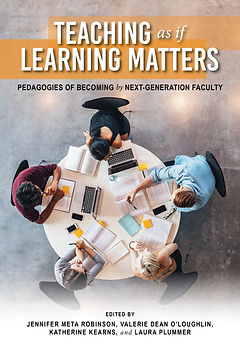Jennifer Meta Robinson

Books
Teaching as if Learning Matters
Teaching is an essential skill in becoming a faculty member in any institution of higher education. Yet how is that skill actually acquired by graduate students? Teaching as if Learning Matters collects first-person narratives from graduate students and new PhDs that explore how the skills required to teach at a college level are developed. It examines the key issues that graduate students face as they learn to teach effectively when in fact they are still learning and being taught.
Featuring contributions from over thirty graduate students from a variety of disciplines at Indiana University, Teaching as if Learning Matters allows these students to explore this topic from their own unique perspectives. They reflect on the importance of teaching to them personally and professionally, telling of both successes and struggles as they learn and embrace teaching for the first time in higher education.
The Farmers' Market Book: Growing Food, Cultivating Community
What takes people out into the rain or heat to buy a bag of tomatoes at a farmers' market, when they can purchase them 24-7 in temperature-controlled comfort at the local supermarket? The explosion of farmers' markets across the country attests to Americans' growing desire to have a connection to their food that goes beyond the supermarket. As dissatisfaction with our increasingly homogenized and rootless culture grows, many people now look to farmers' markets for a sense of community.
The Farmers' Market Book examines this national phenomenon through the story of the market in Bloomington, Indiana, and considers the social, ecological, and economic power of farmers' markets generally. Authors Jennifer Meta Robinson and J. A. Hartenfeld describe farmers' markets as a rewarding intersection of rural and urban lives, sustaining and healing both our communities and our relationship to the land. While they may seem nostalgic or idealistic, these markets are both current and forward-looking, cultivating a fresh, diverse space and recognizing the personal differences of community members. An intimate and complex commonground, farmers' markets far more than places to buy food.
Teaching Environmental Literacy
To prepare today's students to meet growing global environmental challenges, colleges and universities must make environmental literacy a core learning goal for all students, in all disciplines. But what should an environmentally literate citizen know? What teaching and learning strategies are most effective in helping students think critically about human-environment interactions and sustainability, and integrate what they have learned in diverse settings? Educators from the natural and social sciences and the humanities discuss the critical content, skills, and affective qualities essential to environmental literacy. This volume is an invaluable resource for developing integrated, campus-wide programs to prepare students to think critically about, and to work to create, a sustainable society.
Edited by Heather L. Reynolds, Eduardo S. Brondizio, and Jennifer Meta Robinson
with Doug Karpa and Briana L. Gross
Scholarship of Teaching and Learning Book Series
The Scholarship of Teaching and Learning series showcases new inquiry into the relationship between teaching and learning in post-secondary education. Drawing on disciplinary approaches, scholars from the humanities, social and natural sciences, and professions share theoretical frameworks and investigative outcomes while situating their work within broader contexts that transcend disciplinary boundaries. This series aims to support a transformative agenda for higher education by advancing understanding of what matters in student-centered learning and catalyzing innovation and improvement in teaching. Contact: Sarah Jacobi, Acquiring Editor, sajacobi@indiana.edu
Jennifer Meta Robinson and Whitney M. Schlegel, editors
A Cultural Approach to Interpersonal Communication
Featuring several all-new chapters, revisions, and updates, the Second Edition of A Cultural Approach to Interpersonal Communication presents an interdisciplinary collection of key readings that explore how interpersonal communication is socially and culturally mediated.
-
Includes key readings from the fields of cultural and linguistic anthropology, sociolinguistics, and communication studies
-
Features new chapters that focus on digital media
-
Offers new introductory chapters and an expanded toolkit of concepts that students may draw on to link culture, communication, and community
-
Expands the Ethnographer’s Toolkit to include an introduction to basic concepts followed by a range of ethnographic case studies


SELECTED REVIEWS
"27 years after Barr and Tagg proposed 'a new paradigm for undergraduate education' by provocatively imagining a shift 'from teaching to learning,' this book chronicles a new paradigm for graduate education with an integrated vision of 'teaching as if learning matters.' More broadly, this integration of learning—the teacher-authors' and their students'—into the work of teaching, the book reminds us that good teachers are always becoming."
Nancy Chick / Rollins College
“Anyone reading [Teaching Environmental Literacy] will walk away with ideas for how to address the most critical issue of the 21st century in his or her classroom. For that reason, I recommend this book for a much larger audience than college and university faculty. Even educators who work with our youngest children will find fodder in this book for self-reflection about what, why, and how to teach. I recommend it for teachers of all stripes who work to promote a sustainable future for our children."
National Science Teachers Association





